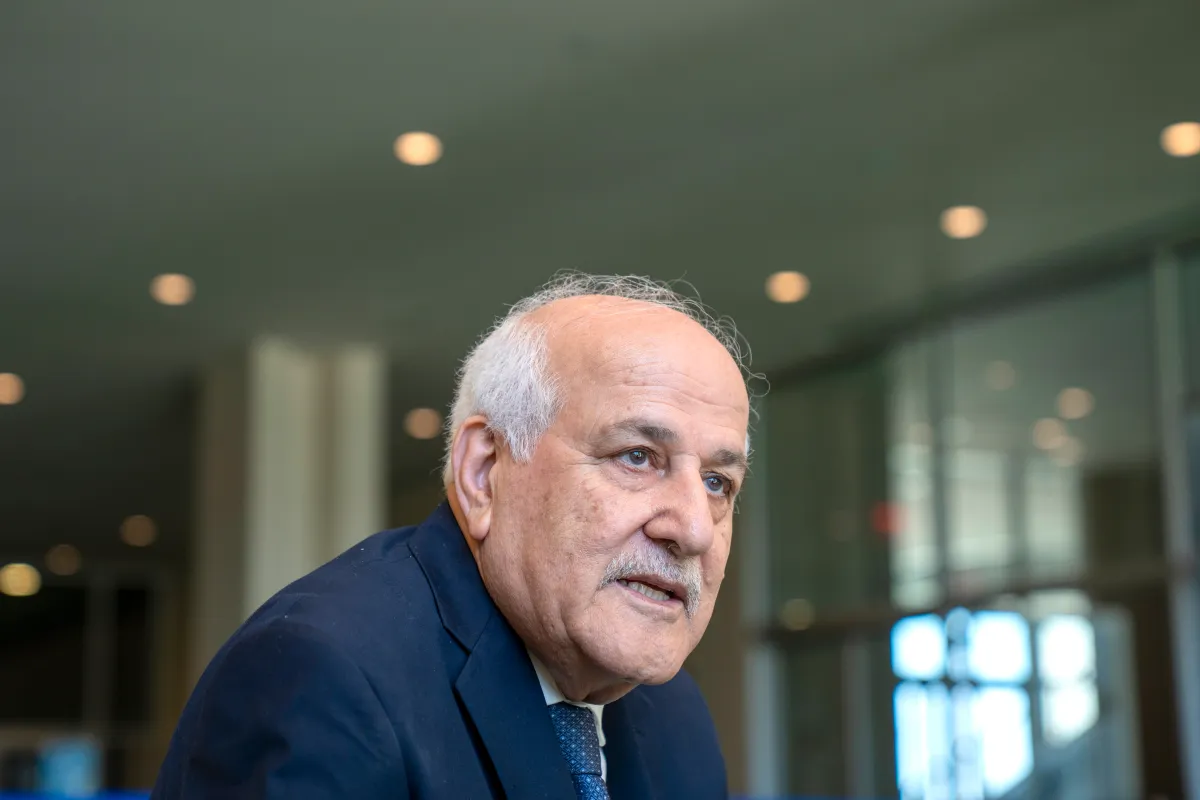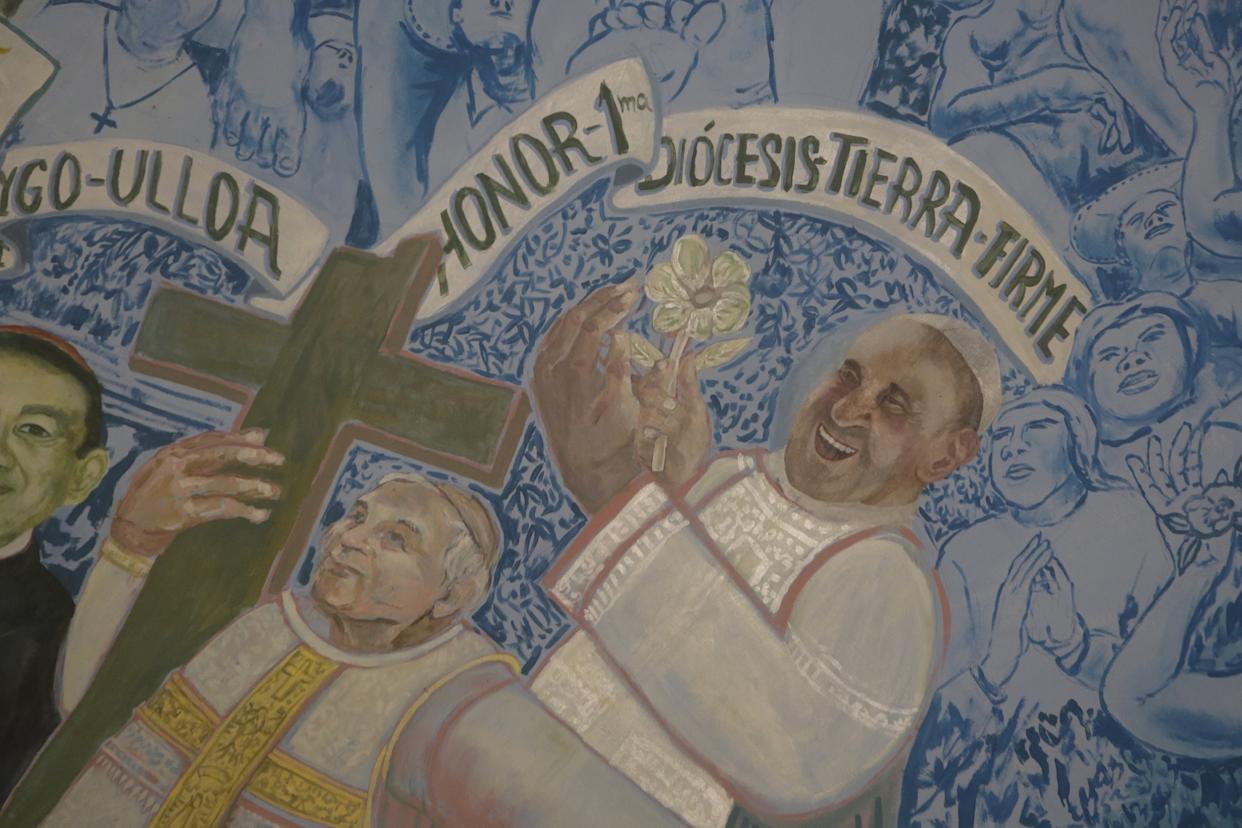International
The Palestinian ambassador to the UN believes that Spain “opened a door that others will follow”

The Palestinian ambassador to the UN, Ryad Mansour, believes that Spain is in the group of “brave countries that opened a door that others will follow,” in reference to the recognition of the State of Palestine, which materializes on Tuesday.
In an interview with EFE at the UN headquarters, Mansour, 77, emphasizes that Spain, along with Ireland and Norway, has exercised “a sovereign right,” and is therefore a decision that “competes with Spain, its institutions and its people,” so he does not understand “the hysterical reaction of Israel.”
Mansour has been at the head of the Palestinian mission at the UN for 19 years and has become famous in recent months for starring in emotional speeches in the General Assembly or the Security Council in which he has been about to cry in the hardest days of the war.
Since last October 7, when the war began in Gaza with the attack in Hamas, he has deployed tireless activity in the corridors of the UN and has managed, for example, to unite the Arab Group of ambassadors and make them appear together regularly before the media, thus overcoming their differences present in almost all other conflicts.
Mansour believes that Israel has an “elitist and racist” attitude when he arrogates the right to tell countries whether or not they should recognize Palestine, or when he describes that recognition as “hostile”, to which he replies: “Is Spain an enemy of Israel because it believes in peace and invests in it? Please, it’s crazy!” he says, emphasizing that Spain has “a long historical relationship with Israel” (it recognized the Hebrew State in 1986) that no one doubts.
And although Israel has despised that recognition of Palestine as insignificant, Mansour questions it: “Don’t you care? Don’t they care about the bilateral relationship, the military assistance, the economic relationship? The hysteria with which they have accepted the decision (of recognition) is eloquent, otherwise why this fury? Why those measures against Spain, against Palestine?” he says, in relation to Israel’s announcement to prohibit the Spanish Consulate from providing services in the West Bank.
For the ambassador, there is no doubt that the decision of recognition has paved the way for others to do soon – he cites Belgium, Portugal, Luxembourg or Slovenia – and he says that this “door they have opened” works in two ways: it makes the decision of those already favorable easier and hinders resistance between those who oppose.
He has no doubt that it is a decision with echoes beyond Europe, since it can encourage other countries such as Canada, Australia, New Zealand, Japan or Korea. “The brave ones who started by opening that door will help them take the extra step in the right direction,” he says.
Mansour also believes that the admission of Palestine as a full member of the UN – vetoed alone by the United States on April 18 – is a matter of time, and recalls that other countries subject to vetoes, such as Italy itself before 1955, or the two Koreas, ended up accessing the UN through the big door. Palestine is now just an “observer state.”
“Why do we have to be at the mercy of what the occupier (Israel) says?, that violates our right to self-determination,” he explains, alluding to the reasoning that the United States – and others such as the United Kingdom or France – always repeats that a Palestinian State and its entry into the UN is something that must be the result of a negotiated resolution with Israel.
The ambassador is careful to openly criticize the United States for its unwakeable support for Israel, but says that when President Joe Biden talks about the solution of the States, he must specify it: “Are you going to ask for the settlements to stop? Land annexations in East Jerusalem? Are you going to reconsider the transfer of the Embassy? Tell me, what steps are you going to take?”
Regarding whether he prefers a Democratic government or a return of Donald Trump – president who multiplied more of the gestures towards Israel – the ambassador says he does not plan to make comments on national policy, but he recalls one detail: that in the Trump administration, after nine months of relative “honeymoon”, the United States changed its position and “the relationship became very bad.”
International
DHS Secretary Kristi Noem’s Purse Stolen in D.C. Restaurant Heist

The purse of Kristi Noem, Secretary of the Department of Homeland Security, was stolen on Sunday night at a restaurant in Washington, D.C., Fox News Digital confirmed through several agency sources.
The handbag, taken by a white male wearing a mask, reportedly contained $3,000 in cash along with personal documents, including her passport, keys, driver’s license, and DHS badge, according to an agency spokesperson.
“Her entire family was in town, including her children and grandchildren. She was celebrating her retirement by treating them to dinner, activities, and Easter gifts,” the spokesperson added.
Crime continues to be a significant issue in the U.S. capital, particularly theft. However, violent crime reached its lowest level in 30 years last year, according to the Office of the Attorney General at the time.
International
Pope Francis: The Quiet Architect Behind the U.S.-Cuba Thaw

When then-U.S. President Barack Obama and Cuban President Raúl Castro announced the reestablishment of diplomatic relations in December 2014—after decades of hostility—there was a third figure present in both speeches: Pope Francis.
This thaw in U.S.-Cuba relations—later reversed by Donald Trump—was the result of behind-the-scenes negotiations personally encouraged by Pope Francis, who passed away on Monday at the age of 88, just over a year after becoming head of the Catholic Church.
Upon learning the news of the breakthrough, the pontiff humbly stated, “This was made possible thanks to the ambassadors and to diplomacy,” which he called “a noble, very noble job.”
In 2015, months after the announcement, Raúl Castro visited the Vatican and met with the pope. Over time, Castro developed a fondness for Francis that he never had for his predecessors, Benedict XVI and John Paul II. “If the Pope continues talking like this, sooner or later I’ll start praying again and return to the Catholic Church—and I’m not joking,” said the younger Castro, who, like his brother Fidel (1926–2016), had been educated by Jesuits—the same order to which Pope Francis belonged.
Pope Francis visited Cuba later that year. Just days before his arrival, the Cuban government announced the pardon of 3,522 common prisoners as an act of clemency.
While in Havana, the pope met with Fidel Castro, who gave him a first edition of the book Fidel and Religion by Brazilian friar and liberation theologian Frei Betto.
Criticism from the Opposition
Francis’s diplomatic approach also drew criticism from parts of the Cuban opposition. In a 2022 interview with Univision, the pope revealed he had “a human relationship” with Raúl Castro.
International
Dominican Republic Declares Three Days of Mourning for Pope Francis

Dominican Republic President Luis Abinader has declared three days of national mourning starting Tuesday following the death of Pope Francis, who passed away on Monday at the age of 88 in his residence at the Casa Santa Marta.
In an official decree, Abinader highlighted the pope’s legacy “as a global leader who promoted significant reforms within the Catholic Church and was known for his humility, openness to dialogue, and commitment to peace among nations.”
During the mourning period, the national flag will be flown at half-staff at military facilities and public buildings.
According to a statement from the Office of the Presidency, although Pope Francis never visited the Dominican Republic during his papacy, he maintained a close relationship with the country. He expressed solidarity and empathy during difficult times, including offering prayers for the victims of the recent tragedy at a Santo Domingo nightclub on April 8, which claimed 232 lives and left more than 180 injured.
-

 Central America5 days ago
Central America5 days agoNicaraguan Exiles to Mark 7th Anniversary of 2018 Protests with Global Commemorations
-

 International5 days ago
International5 days agoDominican ‘False Hero’ Arrested for Faking Role in Nightclub Collapse That Killed 231
-

 Central America4 days ago
Central America4 days agoUN complaint filed against Costa Rica over detention of migrant children
-

 International4 days ago
International4 days agoACLU seeks emergency court order to stop venezuelan deportations under Wartime Law
-

 Central America2 days ago
Central America2 days agoSenator Van Hollen Meets with Deported MS-13 Member in El Salvador; Trump and Bukele React
-

 International3 days ago
International3 days agoThousands rally nationwide against Trump’s threat to U.S. democracy
-

 International2 days ago
International2 days agoPope Francis Appears for Easter Blessing, Calls for Peace and Religious Freedom
-

 Central America19 hours ago
Central America19 hours agoCardinal Rodríguez to Attend Funeral of Pope Francis: “He Was Very Dear to Me”
-

 Central America19 hours ago
Central America19 hours agoNicaragua’s Ortega and Murillo Mourn Pope Francis, Acknowledge ‘Difficult’ Relationship
-

 International19 hours ago
International19 hours agoDominican Republic Declares Three Days of Mourning for Pope Francis
-

 International19 hours ago
International19 hours agoDHS Secretary Kristi Noem’s Purse Stolen in D.C. Restaurant Heist
-

 International19 hours ago
International19 hours agoPope Francis: The Quiet Architect Behind the U.S.-Cuba Thaw















